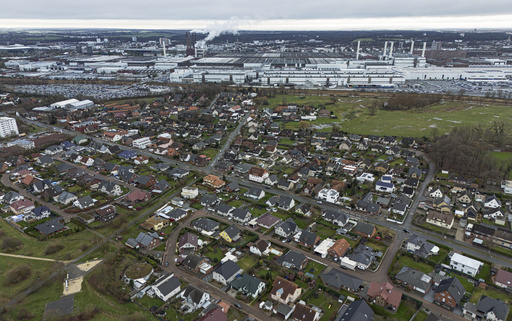
MULFINGEN, Germany — Germany is in urgent need of a new economic framework, as its traditional model—dependent on inexpensive natural gas from Russia and strong exports to China—has failed. This predicament has led Europe’s largest economy into stagnation and unrest regarding its economic future. The pivotal task for the government formed after the upcoming national elections on February 23, which are being held seven months earlier than scheduled, will be to devise a strategy to stimulate growth. The once-lauded country for its high-quality production has not experienced significant economic growth for five years.
A combination of factors has contributed to Germany’s decline from an industrial giant to a post-pandemic follower. Key issues include excessive bureaucracy, a shortage of skilled labor, a slow pace of technological advancement, and a lack of clear governance direction from the incumbent coalition. Furthermore, the nation has had to grapple with increased competition from China and surging energy costs stemming from the ongoing conflict in Ukraine.
Klaus Geissdoerfer, the CEO of industrial fan manufacturer EBM-Papst, emphasized the need for a more business-friendly political landscape. He remarked, “We have bright talent in Germany and strong companies, but there is a disconnect between our capabilities and the political acknowledgment of those needs.”
As elections approach, business discontent is growing louder. EBM-Papst, which boasts annual revenues of 2.5 billion euros ($2.6 billion) and maintains production facilities across three continents, has particularly felt the strain, particularly in its home market, which saw a 4.1% revenue decrease last year. Geissdoerfer noted that their heating technology sector experienced an 18.7% decline in sales, criticizing the government’s confusing regulations as detrimental to business interests.
The implementation of the Building Energy Act, advocated by Chancellor Olaf Scholz’s three-party coalition, contributed to hesitance among property owners regarding necessary upgrades to heating systems. The law led many to delay essential improvements or hastily purchase new gas appliances in anticipation of the regulation’s enforcement, which negatively impacted demand for EBM-Papst’s energy-efficient heat pump fans.
Geissdoerfer raised concerns about bureaucratic burdens, pointing out that a new 2023 law requires businesses to report on climate control efforts, diverting valuable resources from actual implementation of energy-saving measures. He voiced hope that the forthcoming government would address this overwhelming documentation demand, which hinders practical progress.
Meanwhile, EBM-Papst is adapting by focusing investments in green and digital technology—aligning with economists’ recommendations for Germany’s industrial strategy. The firm is providing efficient cooling systems for energy-demanding data centers and developing AI-based solutions to help optimize energy consumption and predict equipment needs.
To navigate the challenges posed by the sluggish German economy, the company is turning to markets in Asia and the United States, with operations established in locations like Farmington, Connecticut, and Telford, Tennessee. These international ventures predate the pandemic and help shield EBM-Papst from potential trade tariffs that might emerge.
On top of domestic hurdles, global relationships have further complicated Germany’s economic landscape. Following Germany’s support for Ukraine during the war, Russia has largely halted its natural gas shipments. As a result, electricity costs have soared to levels 2.5 times greater than in the United States and China.
The Mecanindus-Vogelsang Group, known for manufacturing precision parts for automotive and industrial use, is also feeling the pinch, reporting that its electricity expenses in Germany are double those of its U.S. facilities. CEO Ulrich Flatken characterized this disparity as a “gigantic competitive disadvantage,” stressing the urgency for competitive energy pricing to prevent ongoing deindustrialization.
Moreover, a shift in China’s manufacturing landscape has compounded Germany’s challenges. The country, which once thrived from exporting machinery and automobiles to China, has seen its exports decline as Chinese companies began producing comparable products with government backing, eroding market share.
Germany’s economy has contracted for two consecutive years. By the end of 2024, the economy is projected to expand by only 0.3% relative to 2019, prior to the outbreak of the pandemic. In comparison, the U.S. economy grew by 11.4% during that same timeframe, while China’s growth reached 25.8%.
Marcel Fratzscher, head of the German Institute for Economic Research, noted that a sense of complacency emerged during the boom years of Chinese exports, resulting in German manufacturers being slow to adopt new technologies such as electric vehicles. He stated, “The prosperity of the 2010s may have clouded the understanding that adaptation is necessary.”
As the economic stagnation continues, a prevailing sense of “mental depression” pervades the landscape, contributing to widespread pessimism among both businesses and the public, leading to reduced investment. Business leaders and economists broadly suggest that the next government needs to relax constitutional restrictions on debt, which would facilitate increased public spending for infrastructure and education as a strategy for revitalization.
Fratzscher cautioned that if political figures do not embrace transformative approaches, they may mirror the stagnation that has afflicted the economy. The established culture of consensus and stability in Germany could hinder rapid advancements, making it essential to shift the mindset toward a more agile economic transformation.

